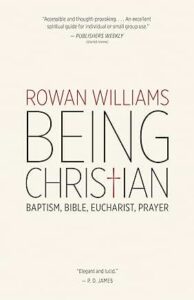 Summary: An Abbot feels he receives a call from God to leave his order and return to the world.
Summary: An Abbot feels he receives a call from God to leave his order and return to the world.
I am working my way back through Susan Howatch’s Church of England series. This six book series is about four different Church of England clergy told from five different main characters (one is told from the perspective of a mistress) over 30 year period.
Glamorous Powers was probably my least or second least favorite of the series on the first reading. But I discovered a lot more depth on a second reading. The first time I read this on kindle, this time I switched to audiobook.
As with all of Howatch’s writing, I think there is too much melodrama. But the melodrama makes a lot of sense to the story here. Jon Darrow is an Anglian monk. He is Abbot of one of the houses of the Fordite order (the order is fictional, but according to Wikipedia there are about 2400 Anglican Monks or Nuns around today.)
Darrow is the spiritual director from Glittering Images, the first book in the series. In the first book, Darrow was a near perfect figure, always knowing what to do, in near perfect communion with God and using his psychic abilities for spiritual direction. But several years after the first book he receives a vision that he interprets is a sign from God to leave the order and re-enter the world.
 Summary: An evaluation of Billy Graham’s place in history.
Summary: An evaluation of Billy Graham’s place in history. Summary: The church is where we we can learn to grow up as Christ intends.
Summary: The church is where we we can learn to grow up as Christ intends. Argo: How the CIA and Hollywood pulled off the most audacious rescue in History by Tony Mendez is his first-hand account of the rescue of six Americans during the Iran hostage crisis. As the lead operative on the project, Tony recounts how he hatched the plan, carried out preparation and executed the plan so that everyone would be brought home safely. This spy story is set apart from others because this rescue was successful in part because Hollywood was used to make the mission a success.
Argo: How the CIA and Hollywood pulled off the most audacious rescue in History by Tony Mendez is his first-hand account of the rescue of six Americans during the Iran hostage crisis. As the lead operative on the project, Tony recounts how he hatched the plan, carried out preparation and executed the plan so that everyone would be brought home safely. This spy story is set apart from others because this rescue was successful in part because Hollywood was used to make the mission a success.


 Takeaway: One of the best examples of how fiction is important to give form to important ideas.
Takeaway: One of the best examples of how fiction is important to give form to important ideas. Summary: God is God of all of us, not just the extraordinary that get the world’s attention.
Summary: God is God of all of us, not just the extraordinary that get the world’s attention.